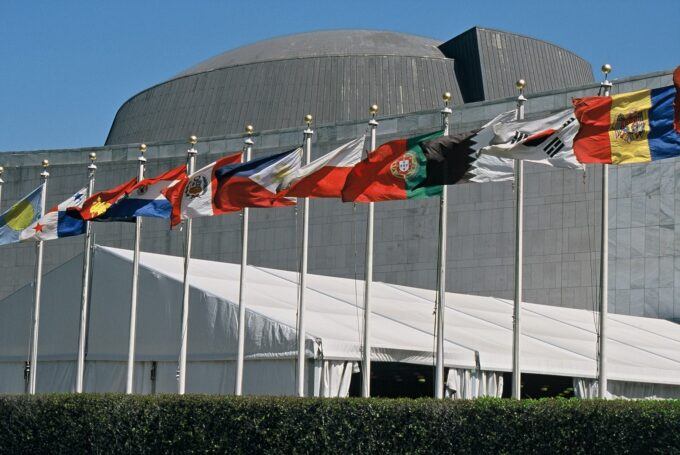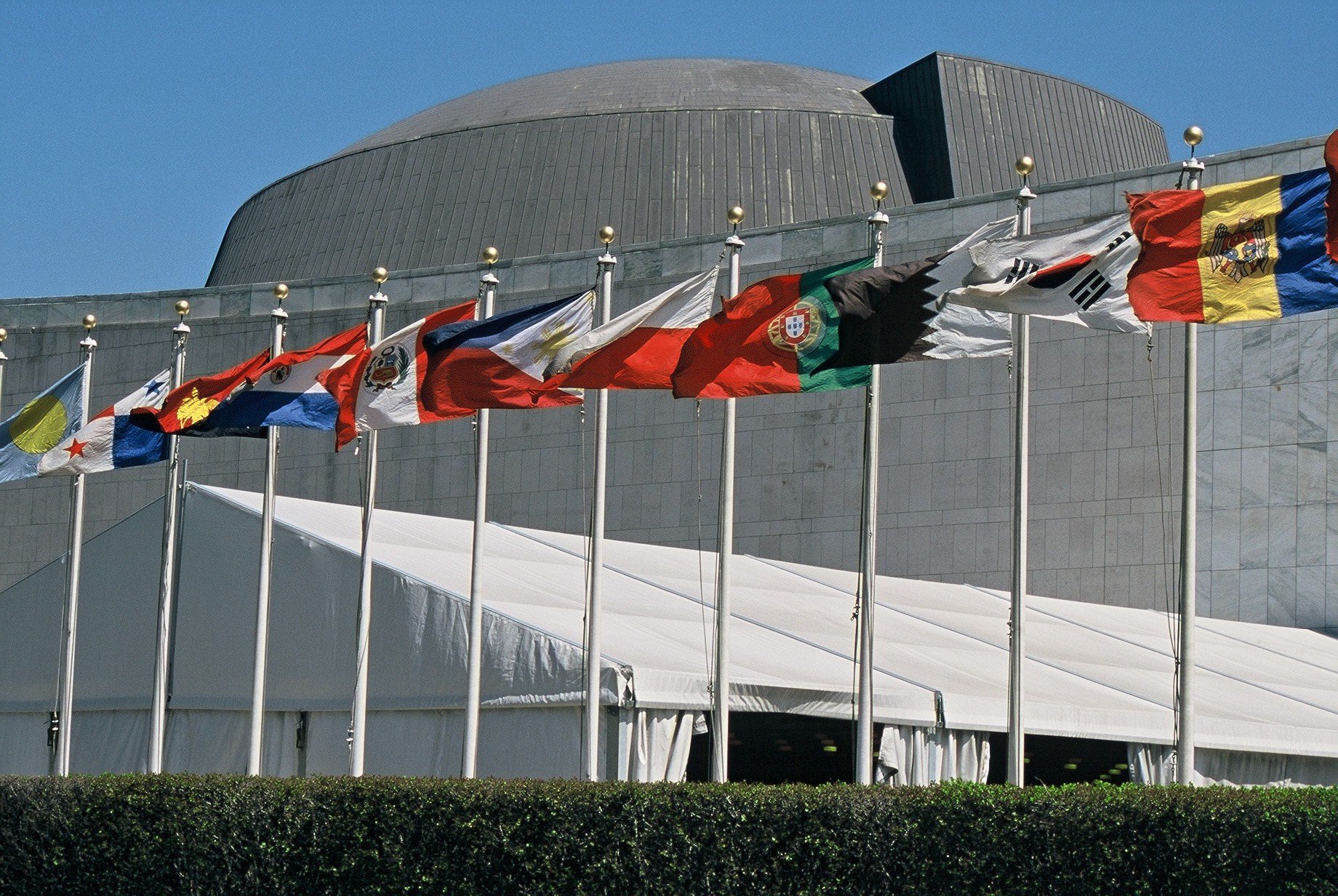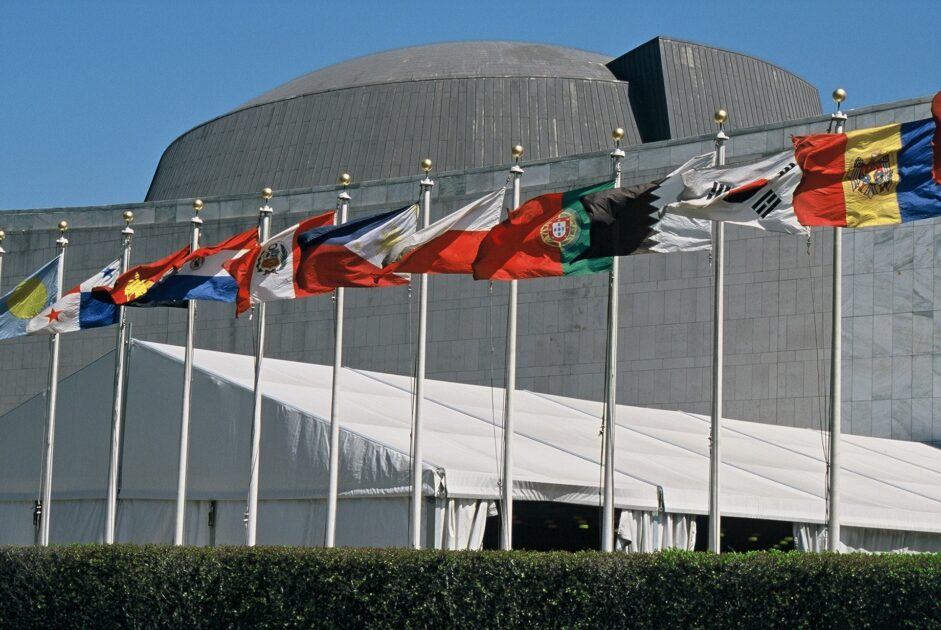Photograph Source: I, Aotearoa – CC BY-SA 3.0
Amid the brouhaha over Charlie Kirk’s assassination, Russia’s threatening drones in Poland, Israel’s now confirmed genocide in Gaza and aggression against its neighbors, is it worth talking about the United Nations’ 80th anniversary? Counterintuitively, now is perhaps just the right moment. Calls for ceasefires and peaceful solutions to state-to-state fighting are similar to U.S. calls for depolarization and dialogue. The U.N.’s failures to secure international peace and security reflect U.S. domestic political failures to foster civilized dialogue and full human rights for all. At best, the U.N.’s 80th anniversary is a proper reminder of values beyond misplaced nationalism, tribal fidelity, and wanton violence. The U.N. should be proud it has lasted longer than the League of Nations, only 26 years, but conscious that as being 80 is critical for individuals, the U.N.’s 80th anniversary is critical for its continuing relevance.
The U.N.’s 80th anniversary
The U.N’s 80th anniversary focuses on attempts to revitalize the organization. The UN80 Initiative, launched in early 2025, is less a victory celebration of reaching the ripe age of 80 than an attempt at a serious reworking of an organization seemingly in intensive care on life-support. Institutions, like individuals, need constant re-energizing, and 80 years-old is a crucial moment. Officially, according to a March 2025 U.N. press release, “the ‘UN80 Initiative’ builds on ongoing efforts, including the Pact for the Future and UN 2.0, which aim to update the UN’s structures, priorities, and operations for the 21st century.” The Initiative “seeks to develop proposals in three key areas,” the U.N. Secretary General Antonio Guterres said; “identifying efficiencies and improvements, reviewing the implementation of mandates from Member States, and a strategic review of deeper, more structural changes and programme realignment.”
As with any private enterprise, the public U.N.’s reworking priorities begin with dollars and cents. First and foremost, the U.N. is in a financial crisis. “For at least the past seven years, the United Nations has faced a liquidity crisis because not all Member States pay in full, and many also do not pay on time,” Guterres explained. As of March 11, 2025, the press release noted, “only 75 of the 193 Member States have paid their assessed contributions in full towards the $3.72 billion 2025 budget for the Organization.”
Out of cash, unable to provide a primary function of securing peace and security in the Middle East and Ukraine, why shouldn’t the United Nations follow its short-lived predecessor, the League of Nations?
A premature announcement of the U.N.’s death
But all should not be negative at reaching 80. An interview with Georges Abi-Saab, eminent legal expert, former professor and judge and friend of U.N. Secretary Generals, gave me the following three optimistic insights:
“The United Nations is the only universal forum which can express and legitimize the collective will of the international community,” Abi-Saab observed. As an example, the vetoed-blocked Security Council (SC) was able to condemn the recent strike on Qatar’s capital Doha even if it did not mention Israel. All 15 members of the Security Council agreed. Withstanding the SC blockage can be overcome by other means, Abi-Saab mentioned, such as the General Assembly’s Uniting for Peace Resolution as Richard Falk described in an interview with Daniel Falcone. (The United Nations Must Act in Gaza Under the Uniting for Peace Resolution (U – CounterPunch.org) Israel has until September 18, 2025, to comply with the advisory opinion of the International Court of Justice to withdraw from the Occupied Palestinian Territory, dismantle its settlements, and evacuate its settlers. If Israel does not comply, which it probably won’t, the General Assembly can implement several measures based on historical precedents. It could, for example, deploy a UN peacekeeping mission or civilian protection force; the United Nations does deploy 60,000 peacekeepers around the world.
“Talking about the successes and failures of the United Nations should not be limited to peace and security,” Abi-Saab noted. “Attention should be given to its lateral, specialized agencies such as those that deal with the environment.” Recently, the World Trade Organization (WTO) held a ceremony to celebrate the entry into force of a trade deal to curb subsidies for harmful fishing. At least two thirds of member states had to ratify the deal for it to enter into force, a significant victory for the environment and multilateralism. (Abi-Saab was a former president of the WTO Appellate Body Dispute Settlement Organ.)
“There are signs of resistance to Donald Trump’s anti-multilateralism, evidence of a coalition of the willing to counter Trump,” Abi-Saab explained. The Shanghai Cooperation Organization (SCO), he added, is not an alternative multilateral structure to the U.N.; China is interested in smooth external state relations within the U.N. system while opposed to domestic criticisms coming from bodies like the U.N. Human Rights Council. According to Abi-Saab, the SCO aims to create an alternative multilateral system of payments outside the dollar rather than replacing the United Nations system as a whole.
U.N. and U.S. renewal?
Is the inability of the United Nations to implement many of its guiding principles similar to failures within the United States? Where is a sense of community or common good internationally (Erga omnes) and domestically? While people complain about renewed populism/nationalism/isolationism hindering international cooperation, the assassination of Charlie Kirk reflects a lack of serious dialogue across the American political spectrum as well. There are obvious similarities between blocked international cooperation and polarization within the United States. Negotiation and compromise are essential between states as they are between people.
Speaking at Gettysburg, Pennsylvania, in 1863 following the Battle of Gettysburg during the American Civil War, President Abraham Lincoln spoke of the possibilities for American renewal. “Four score and seven years” after the founding of the United States, Lincoln referred to a “government of the people, by the people, for the people.” The Preamble of the United Nations Charter begins “We the Peoples of the United Nations.” Lincoln emphasized people, the Preamble begins with peoples. And if Lincoln said that “this nation…shall have a new birth of freedom” some 80 odd years after it was “brought forth” by the Founding Fathers, the UN80 Initiative tries to give the only universal intergovernmental organization a new birth of freedom as well. When Lincoln said that “the government…shall not perish from the earth,” could the same be said about the United Nations? In only 57 countries/regions around the world do people have life expectancy above 80 years. Will the United Nations have a life expectancy and relevance after 80?
The post The UN Turns 80, a Critical Age for People and the UN’s Relevance appeared first on CounterPunch.org.
From CounterPunch.org via this RSS feed






